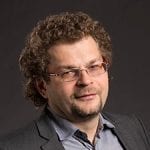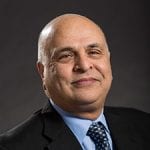 |
Nidal Abu-Zahra UWM Associate Professor Department Chair, Materials Science and Engineering Dr. Abu-Zahra’s multi-disciplinary education and training spans mechanical, manufacturing, industrial, and materials engineering with emphases on the design and validation of materials and processes with new properties and applications. His work on reducing overall manufacturing costs includes several key industry projects, with focus on addressing materials and process wastes concurrently to optimize the materials composition and processing conditions, with consideration for the equipment and people constraints in the manufacturing environment. A true believer in partnership between academia and industry, Dr. Abu-Zahra has conducted a diverse array of industry and research projects, ranging from metal turning and drilling operations to plastics extrusion and injection molding, materials for water filtration and purification, structural plastics, and polymer solar cells, by leveraging the diverse academic backgrounds of his PhD students, whose areas of study include chemistry, physics, mechanical, industrial, chemical, and polymer engineering. His methodology of embedding his graduate students within the company teams and implementing standard industry practices in managing his projects and researchers has resulted in many success stories for his industry partners and for his graduate students. |
 |
Rani El Hajjar UWM Associate Professor, Civil and Environmental Engineering Director, UWM Engineering Mechanics and Composites Research Laboratory Dr. El Hajjar has expertise in outlining quality controls, understanding testing and certification requirements and ensuring build reliability in lightweight polymer-based composite materials.He is a field leader on carbon fiber and cellulose nanofiber composites, and the author of the upcoming book “Practical Design and Validation of Composite Structures.” His research focus is on testing composite structures for safety, developing composite materials for zero greenhouse emissions and developing on-site, non-destructive testing methods. He is recognized for his industrial expertise in advanced materials at SpaceX, Boeing and Intel corporations; he led the UWM team that was named one of five universities by NASA to participate in the 2015 X-Hab Academic Innovation Challenge. |
 |
Xiaoli Ma UWM Assistant Professor, Materials Science and Engineering Xiaoli Ma joined UWM after his postdoctoral work at University of Minnesota in the Department of Chemical Engineering & Materials Science. He obtained his PhD in Materials Science and Engineering at Arizona State University. His current research focuses on the design and development of advanced materials for separation, purification and sensing technologies. His group is mostly interested in polymers, porous materials (metal-organic frameworks, zeolites, carbons, mesoporous materials, etc) and their nanocomposites. They seek to develop robust sorbents, membranes and sensors by combining synthetic chemistry, materials processing with device design and fabrication. His group is particularly interested in developing scalable and cost-effective materials processing methods that can be incorporated into the manufacturing of high performance membranes. These membranes are used for water purification, solvent dehydration, organic solvent nanofiltration, purification of dairy ingredients, gas separation and other challenging separation processes. The innovative processing methods developed in his group can also be used for coating and thin film applications. |
 |
Junjie Niu UWM Assistant Professor, Materials Science and Engineering Associate Editor RSC Advances, a publication of the Royal Society of Chemistry Dr. Junjie Niu is an Assistant Professor in Department of Material Science and Engineering at University of Wisconsin-Milwaukee. He received Ph.D. in Materials Science from Zhejiang University. Before joining in UWM, Dr. Niu worked as a Postdoc Associate at the Massachusetts Institute of Technology (MIT) from 2011 to 2014. He also did interdisciplinary research as a Postdoc Associate at the Drexel University and the University of Pennsylvania (UPenn) from 2009 to 2011. Dr. Niu’s interdisciplinary research includes understanding fundamental science in physics/chemistry/mechanics, and engineering materials in applications of energy storage and water-energy nexus. In particular, lithium-based batteries, advanced lead-acid battery, self-cleaning, water purification and air purification. Dr. Niu has published over 70 papers in peer-reviewed journals including 3 Nature series journals with a total citation 4900+ and h-index of 33 and filed over 5 US patents. |
 |
Krishna Pillai UWM Professor, Mechanical Engineering Director, Laboratory for Flow and Transport Studies in Porous Media Pure math and physics form the cornerstones of Dr. Pillai’s work in solving transport problems in porous media. He is one of the few researchers worldwide capable of applying the volume averaging technique method—a rigorous technique to upscale flow and transport in porous media—which forms the basis for computer simulation that can be used to optimize and refine any industrial process.An NSF CAREER grant supported Dr. Pillai’s path-breaking research on simulating the fiber-wetting process in RTM and VARTM type technologies for manufacturing glass- and carbon-based polymer composites. His research group has also developed models and simulations for metal-matrix composites, as well as bio-bases cellulose nanofiber based ‘green’ composites. Over the years, he has received significant funding from several companies including Kimberly-Clark Corporation and SC Johnson for problems involving optimization of liquid-flow (wicking) in porous substrates.See more details on his research . |
 |
Pradeep Rohatgi UWM Distinguished Professor, Materials Science and Engineering Also joint Professor in Mechanical Engineering and Biomedical Engineering Director of UWM Centers for (i) Composites, and (ii) Advanced Materials Manufacture Areas of expertise include: metal matrix composites, materials processing including casting, lightweight materials, low energy embodied materials, high performance structured materials including aluminum alloys and steels, smart materials: self-healing, self-lubricating, and self-cleaning, and bio-derived and biomedical materials and materials policy.Dr. Rohatgi’s research has been supported by the National Science Foundation, U.S. Department of Energy, Office of Naval Research, Tank and Automotive Command, Army Research Laboratory, Electric Power Research Institute, United Nations and several major corporations including Ford, General Motors, GE Medical, Oshkosh Truck, Rockwell Automation, A.O.Smith, Sunstrand, and Briggs and Stratton. Dr. Rohatgi has 360 Reference Journal Papers, 20 US. Patents, twelve authored and co-educated books, and has received numerous awards for excellence in research, including election to Fellowships of National Academy of inventors, Materials Research Society, The Minerals, Metals & Materials Society (TMS), ASM International Society of Manufacturing Engineers (SME), and SAE International. |
 |
Benjamin F. Schultz UWM Research Associate, Materials Science and Engineering Dr. Schultz has expertise in the design, processing, testing and characterization of high-performance and lightweight hybrid and composite materials. These include metal alloys, composite materials, foams, nanocomposites, self-lubricating and other tribomaterials, biomaterials, and materials for additive manufacturing. He has published over 40 peer reviewed articles on the topic of advanced materials and manufacturing and he has presented his work to a broad audience including conference attendees (The Minerals, Metals & Materials Society, ASM International, American Foundry Society, Materials Science & Technology, Institute for Defense and Government Advancement), industry professionals, and students ranging in preparation from elementary to graduate school. His current research is on bio-resorbable magnesium alloy foam biomaterials produced using additive manufacturing and casting processes. His work has been funded by the National Science Foundation, the UWM Research Foundation and the Department of Defense. |
 |
Konstantin Sobolev UWM Professor, Former Chair, Civil and Environmental Engineering Advanced concrete is Dr. Sobolov’s focus, specifically water-resistant and high-performance concrete composites, designed to flex, making them ultimately stronger and last longer. He is working with Spancrete to enhance pervious concrete with a titanium dioxide-based catalyst, which, when activated by sunshine, breaks down organic contaminants from the vehicle exhaust near the concrete. |
 |
Habib Tabatabai UWM Associate Professor, Civil Engineering Dr. Tabatabai’s research focus is on reliability and durability of bridges, repair and rehabilitation, damage detection and structural health monitoring, also is on utilization of byproducts in construction. His work with the Wisconsin Department of Transportation on discovering more efficient ways to extend the life of Wisconsin bridges through the testing and application of several thin, lightweight polymer overlays, was cited as one of the nation’s most promising to address highway and transportation issues by Maintenance Research, a magazine published by the American Association of State Highway and Transportation Officials (AASHTO). |
 |
Hong Teng UW-Platteville Associate Professor, Civil Engineering Hong Teng received his Ph.D. in Theoretical and Applied Mechanics from the University of Illinois at Urbana-Champaign. Currently he is an Associate Professor of Mechanical Engineering at the University of Wisconsin-Platteville. Dr. Teng’s research interests include micromechanics of composite materials and finite element analysis. He has published papers on plastic deformation of particulate composites. |
 |
Mike Zampaloni Professor, College of EMS Graduate Studies Director UW-Platteville Engineering Partnerships Dr. Zampaloni earned his PhD, Master of Science, and Bachelor of Science in Mechanical Engineering from Michigan State University and a Bachelor of Science in Environmental Engineering from Michigan Technological University. Prior to joining UW-Platteville, Dr. Zampaloni taught at Michigan State University, founded a small business that focused on transitioning the thermo-hydroforming process he helped develop at MSU from academia into industry, and is a former officer of the United States Air Force. Dr. Zampaloni is currently the Co-Director of the Center for Device Design and Development (3DC) patnering with both industry and community inventors to take ideas from conception through the prototype development phase and into production-ready capabilities. Faculty page here |